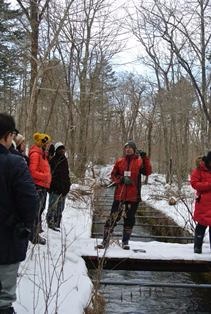【Winter school】International winter school "Changing land systems"
- オフィス GLP

- 2013年9月27日
- 読了時間: 4分
GLP International winter school will be held.
Changing land systems
Training course of ecological monitoring, advanced modeling and integration

Date January 08 -10, 2014
Place Field Science Center for Northern Biosphere, Hokkaido University, Sapporo, Japan
Objectives This intensive three-day course focuses on environmental and social issues caused by changes in land systems.
Through lectures, work sessions, and excursions, students will find their own research questions, obtain scientific knowledge and learn various methods to solve these issues, and extend their ability needed for discussion. English is used throughout the course. This course is organized by Global Land Project(GLP)Sapporo Nodal Office based in Hokkaido University. Through the lectures by the members of GLP office and experts, students will foster global mindset and frontier spirit. Target students Bachelor/Master's/PhD students of Hokkaido University (Common Graduate Courses and HUSTEP "Sustainability Science VII") ※For registration, contact each faculty for the deadline. Master's/PhD students from overseas universities Poster
Schedule Day 1
Theories and the modelling of tree species coexistence in forests by Takashi Kohyama
Global warming and elevational range shift in a subtropical forest by I-Fang Sun
Evaluating tree diversity and ecosystem functions in Asian forests using databases and meta-analyses by Masae Ishihara
Winter climate and plant-soil system in a changing world by Makoto Kobayashi
Forest productivity and the effects of anthropogenic disturbance on biogeochemical cycling by Karibu Fukuzawa
Self-introductory presentation by students
Day 2
Field excursion at Tomakomai Experimental ForestIntroduction about TOEF by Tsutom Hiura
Field course: Plant ecology by Masae IshiharaField course: Soil biogeochemistry by Makoto Kobayashi and Hideaki Shibata
Field course: Stream ecosystem by Fukuzawa Karibu and Hideaki Shibata
Day 3
Web resources for education and research for "Changing Land System"by Hideaki Shibata
Future Applications of Micro-satellite and Advanced Sensors by Yukihiro Takahashi
Sustainability Science in local socio-ecological system -how we survive in harmony with nature- by Noriyuki Tanaka
GLP sustainability studies from geographical approach: A case study for establishing sustainable mountain society in the Pamir by Teiji Watanabe
GIS tool for ecosystem service valuation by Nobuhiko Yoshimura and Hideaki Shibata
Research proposal training in break-out group Poster WinterSchool2013.pdf Contact GLP Sapporo Nodal Office info@glp.hokudai.ac.jp
Report
International Winter School 2013 was held at Hokkaido University during January 8-10th, 2014.
International Winter School 2013 "Changing land systems: Training course of ecological monitoring, advanced modeling and integration"
Venue: Hokkaido University
January 8-10th, 2014

Participants included 26 undergraduate, master and PhD students (15 from Hokkaido University; 2 from Rakuno Gakuen University; 2 from Chinese Academy of Sciences (China); 2 from National Taiwan University (Taiwan); 4 from National Dong Hwa University (Taiwan); 1 from National University of Mongolia (Mongolia)) with 12 academic staffs (3 from National Dong Hwa University; 1 from Rakuno Gakuen University; 8 from Hokkaido University).

This intensive three-day course focused on environmental and social issues caused by changes in land systems. The goal of this winter school was to obtain scientific knowledge and learn various methods to solve these issues, to find their own research questions, and to extend their ability needed for discussion through lectures, work sessions, and excursions.
This course was organized by Global Land Project (GLP) Sapporo Nodal Office based at Hokkaido University.
First Day
On the first day, students learned various theories, modelling, empirical and experimental studies related to biodiversity, ecosystem functions, and biogeochemical cycling, and their responses to climate change and natural/anthropogenic disturbances.
Students also presented self-introduction about their research backgrounds and interests.

Second Day
On the second day, they visited Tomakomai Experimental Forest (TOEF) of Field Science Center for Northern Biosphere, Hokkaido University, a core-site of Japan Long-Term Ecological Research Network (JaLTER).
Although it was very cold, students were excited to experience snowy winter forest.
They were introduced to the facilities and researches of TOEF. They learned the methods of identifying tree species and measuring biomass stock, river water quality and quantity.
They observed frozen soil in deciduous forest and evergreen forest. They saw wildlife and tree specimen and woody crafts at the Forest Museum.
Third Day
On the third day, students learned techniques, tools, and resources to detect and evaluate changes in land systems such as remote sensing by micro-satellites, ecosystem service evaluation by InVEST model, web-based databases of ecological parameters, and whole-landscape trail of research forest.
Methods to study the environmental issues (land degradation, endangered wildlife, deforestation etc.) caused by human society (land use, transhumance, agriculture, poverty) and frameworks to sustainable socio-ecological system such as Satoyama Initiative were also presented in the lecture.
Research projects and networks such as "GLP", "LTER", and "Future Earth" were also introduced as "good practice" of international research activities.
After the lectures, there were group discussion and presentation by students to identify the most important research topics for future research on "Changing Land System". The key topics of the five break-out group were plant dynamics, soil nutrient, water cycle, sustainable development, and science-people communication, respectively.
Overview
Overall, participants were very active to learn and interactive with the lecturers and each other. Because students had diverse backgrounds, we think that this winter school had provided a good opportunity to discuss and think interdisciplinary.
Next winter school are planned to be held in January 2015 at Hokkaido University. Details will be announced through this homepage.
This course was conducted as "Sustainability Science VII" of HUSTEP and common graduate course of Hokkaido University. It was financially supported by the Ministry of Education, Culture, Sports, Science and Technology and the Environmental Research and Technology Development Fund (S-9-3) of the Ministry of the Environment, Japan.





































コメント